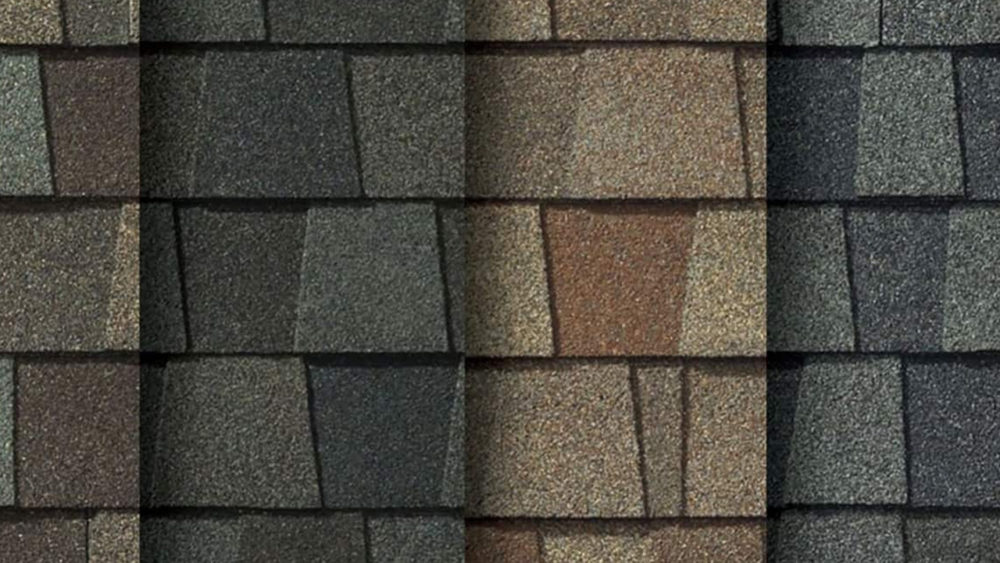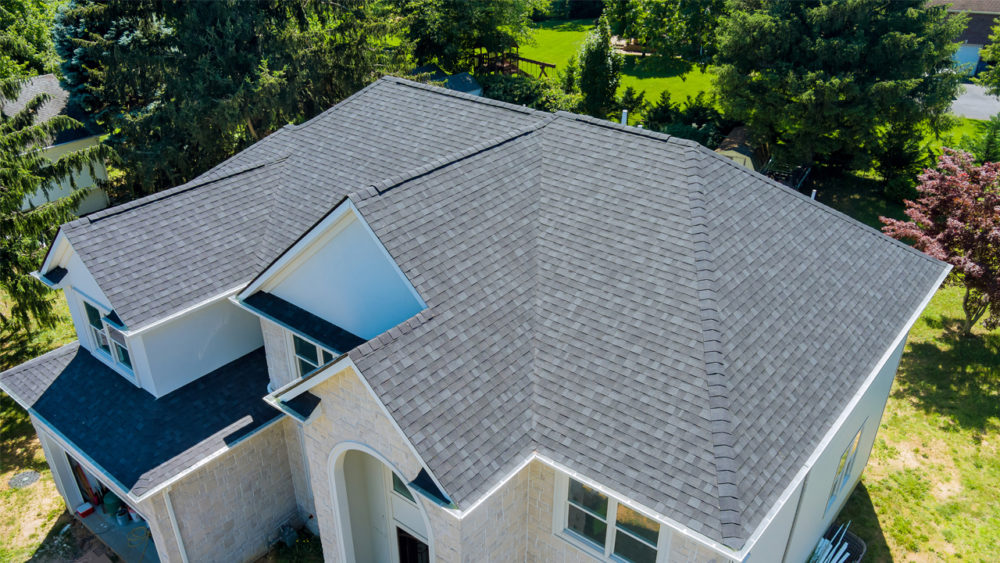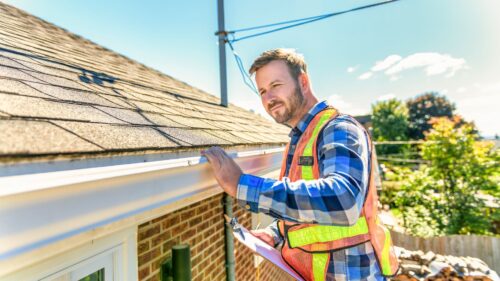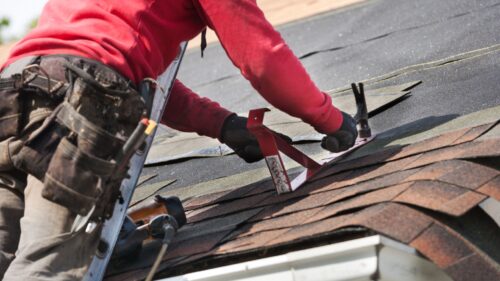Homeowners look forward to an upcoming roofing project for a couple of reasons – they could be repairing a damaged roof by replacing it, remodeling it to suit modern styles, or investing in a new house by installing a new structure. However, most homeowners seem to dread the cost-related aspect that comes with many roofing projects.
As it turns out, numerous factors impact the final cost of a roofing project, such as the total area of your roof, the type of roofing, the material used, and the cost per square foot. If you’re looking into different options, asphalt roofs are the most affordable kind. On average, you’ll be paying between $350 and $550 per square for an asphalt roof.
Types of Asphalt Roofing
Fiberglass Shingles
A popular roofing choice after they were developed in the 1980s, fiberglass shingles is a top preference for homeowners and contractors. They’re made from a woven fiberglass base that’s covered with a layer of waterproof asphalt coating. They’re topped with ceramic granules that act as protection from harmful UV rays.
This durable construction is what makes asphalt shingles so strong despite being thin and lightweight. Due to the fiberglass base, they require less asphalt to make. As a result, these shingles come with a better fire rating compared to organic shingles.
Organic Shingles
This type of asphalt shingle is made using a recycled layer of felt paper as a base. Then, it’s saturated in asphalt to waterproof it and layered with adhesive asphalt. Lastly, it’s embedded with ceramic granules for UV ray protection.
Compared to fiberglass shingles, traditional organic versions have more asphalt in their composition, around 40 percent. As a result, they’re heavier and more expensive to install. Although organic shingles are considered to have features like flexibility, they tend to absorb more moisture, so they warp over time. Not to mention, since they contain more asphalt, they have a bigger environmental impact than fiberglass shingles.
Different Styles of Asphalt Shingles
You can find both organic and fiberglass shingles in different styles of shingles. Sure, manufacturers have their own variations of these styles, but they mainly come in three distinct designs.

Architectural Shingles
Compared to three-tab shingles, this style doesn’t feature cut-outs, but rather an additional layer of asphalt. The lower portion is laminated with asphalt for a multi-dimensional and contoured look. Manufacturers use asphalt sealant to bond the separate layers, which reinforces their waterproof features.
With their 3-dimensional look, they mimic the appearance of slate or natural wooden shingles. Despite their durability, architectural shingles aren’t suited to low-sloping roofs because they’re more prone to face wind-driven rain.
Architectural shingles have a 110mph to 130mph wind uplift rating, so they’ll last longer than three-tab shingles. For this style, manufacturers usually offer 20 to 50 years of limited warranty.
In the case of architectural shingles, your roofing project will require about four bundles to cover one square. This style ranges between $35 and $45 for each bundle, so you’ll be paying around $140 to $180 per square for dimensional shingles. Remember that the average roof size in the U.S. is 22 to 26 squares.
Three-Tab Shingles
Also referred to as ‘entry-level’ roof shingles, the three-tab design is basic and differentiated because of cutouts. They’re manufactured with tabs along the longer lower edge. Upon installation, this gives a unique effect of being three separate layers for every square.
This style of shingles has been used in roofing projects for the longest time, and they’re still very popular as the most economical option. They have a 60mph to 70mph wind uplift rating and most manufacturers offer only a limited warranty. You’ll get a 10 to 25-year limited warranty.
To cover one square of the roofing area, you’ll need three bundles of three-tab shingles. Three-tab shingles are fairly inexpensive and cost approximately $25 to $30 per bundle, so you’ll pay $75 to $90 for one square.
Premium Shingles
This exclusive style is considered a premium type because of its higher cost and distinct appearance. In most cases, premium shingles have a wind uplift rating of 110mph and manufacturers provide a limited lifetime warranty. With premium shingles, you need around 5 bundles to cover one square roofing area.
Since these are the most expensive type, (they cost $45 to $50 per bundle) you’ll be paying $225 to $250 for each square of premium shingle roofing.
Asphalt Roof Costs
When installing a new shingle roof or replacing your old one, the costs will include more than just materials and installation. For a better idea of the different expenses that go into a quote and estimate, we’ve listed down all processes you should take into account.
Removing Previous Roofing
To begin with, your contractor has to decide whether or not to remove your previous roofing. The benefit of installing asphalt shingles is that the contractor can install them over the old roof, but only if the roof deck is still in good condition. If your roof deck needs repairing, if your current roof has wooden shake shingles, or if the current roof has more than two layers of shingles, it needs to be removed.
We mean all the roofing products and materials have to be removed and properly disposed of. After that, your contractor can start installing a new shingle roof. Consult with your contractor when asking for the estimate – if there’s a need to remove your current roofing, ask them to add the cost to your estimate so you don’t get any surprise expenses.
For each square foot, roof removal can add around $3 to $5 to your final quote. Nonetheless, you should keep a larger margin because the cost can increase based on your location and how difficult it is for the contractor to remove your roof.
Adding Roof Rafters Or Trusses
Your roof trusses comprise a framework that provides support for a roof. Rafters are a series of sloped structures, such as wooden beams, that go from the wall plate to the hip or ridge. Rafters are made to support a roof deck and other materials that are installed with it.
Your roof’s trusses or rafters need to be strong enough to support the weight of new shingles, so if they’re rotted or damaged, you need to get new ones. This will add the cost of installing new trusses or rafters to your final quote.
Even if your current rafters or trusses are in good condition, you should still get them reinforced if your new roofing will be heavier than the previous one. The cost of reinforcing roofing support can lie anywhere between $1,000 and $10,000 since it depends on a variety of factors, like your location and how heavy the new roofing materials are.
Using Unique Styles Of Shingles
Nowadays, it’s difficult to tell whether a roof is made from asphalt shingles or some other type of shingles because of the variety of styles available. Manufacturers can design their asphalt shingles to imitate the appearance of different materials, like tile, wood shakes, or slate.
Not to mention, they’re available in a plethora of different colors, usually in shades of green, blue, gray, and wood. In fact, you can even get asphalt shingles customized with a weathered look so that your new roof matches the aesthetic of your older vintage-style home.
If you have a minimum budget and no particular preference for style and color, standard gray three-tab asphalt shingles are the most affordable option. This shouldn’t come as a surprise, but be prepared to pay higher prices for premium styles and colors of asphalt shingles.
Preventing Fungus And Algae
Although modern roofing materials are developed to be resistant to fungus growth, it’s different when you live in an area with a subtropical climate i.e. high precipitation and humidity levels. In this case, you may need to buy algae-resistant shingles to prevent attacks from fungus and algae. Although this will ensure the longevity of your roof, it will definitely add to the cost in the meantime.
Algae-resistant shingles are designed with a coating of leachable copper to prevent severe damage and discoloration from moss and algae growth. Specifically, opting for algae resistance increases your materials budget by 10 to 15 percent.
Shingles Weight
Aside from the type and style, the thickness i.e. weight of shingles also impacts the overall cost. Generally, thicker asphalt shingles tend to last longer, so they have a higher upfront cost. Nonetheless, you can look forward to cost savings in the long run if you won’t need to replace your shingles for a few extra years because thicker shingles last longer.
Safety Considerations For Homes With A Steep Pitch
Homes with a roof that has a steeper pitch increase the safety risk for the person installing asphalt shingles. Therefore, the installation of asphalt shingles on a roof with a steep pitch will have extra costs like safety precautions, staging, and labor.
Moreover, roofs with a steep pitch will need additional underlayment for a Class A fire rating. Needless to say, this adds costs to your overall project.
Pricing Comparisons of Asphalt Shingle Brands
On average, it costs anywhere between $2,000 and $10,000 to install an asphalt shingle roof. The wide range is because the actual cost depends on factors like roof size, pitch, and slope. Then, the price of materials adds to the cost, but even that can vary based on your location.
For comparison, we’ve listed a few major brands and their roofing types along with an average price per square foot. Asphalt shingle roofs are gaining traction among homeowners and contractors because they show great resistance to weather and because they can be customized.
Gaf
GAF is known as the most reliable asphalt shingle manufacturer in the market today. Their products are used in thousands of commercial and residential constructions across the U.S.
25-Year Royal Sovereign Shingles
At the cost of $1 to $2 per square foot, GAF’s 25-Year Royal Sovereign shingles look as if they’re expensive when they’re actually an affordable option for homeowners. They have a wind uplift rating of 150mph and are designed to fulfill aesthetic and safety needs.
Lifetime Timberline Shingles
These cost around $1 to $2 per square foot and have received a Class A fire rating. These shingles are installed with Dura Grip to make sure that they don’t fall or break away in harsh weather conditions like high winds. The availability of color options varies based on your location but they typically include hickory brown, weathered wood brown, slate gray, and charcoal.
Iko
IKO offers a range of different asphalt shingles but we’ll cover the general range. They’re also a common brand trusted by contractors and homeowners alike.
Asphalt Roofing Shingles
Based on the range of shingles you select, you’ll be paying around $2 to $4 per square foot. These are manufactured to be environmentally durable. Hence, they show higher resistance against hail impact, algae growth, and high winds. Unlike other brands’ asphalt shingles, these don’t absorb heat so you’ll be able to reduce your carbon footprint.
Owens Corning
Another reliable brand with affordable asphalt shingles, Owens Corning is known for its high-quality three-tab shingles.
Three-Tab Asphalt Shingles
These cost between $1 and $2 per square foot and they sell at local retailers like Lowe’s for about $20 to $37 per bundle.
You can get them at the same price in an array of color options – from standard shades like tan, black, and gray to distinct hues like green and Spanish red.
How to Choose the Best Asphalt Roof Installer
We’ve mentioned some of the top asphalt shingle manufacturers that you can rely on, but what about your contractor? Selecting the right type, style, and manufacturer of asphalt shingles is just half the journey. Now, you need to research the best contractor options. Finding a reliable roofing contractor can mean getting better performance out of your asphalt shingles.
Ask Other Homeowners for Referrals
Before you can enter a Google search, take a moment to ask the other homeowners in your neighborhood for referrals. Since their homes experience a similar climate and geographical conditions, they may have some feedback on local contractors. Moreover, they can provide feedback on whichever installer completed their roofing project as well.
We recommend that you hire an installer that’s based in your neighborhood or community because they’ll have enough knowledge about the area’s building codes and regulations. Not to mention, they’ll also have access to a big network of building crews and equipment suppliers.
Check the Contractor’s BBB Ratings
Don’t settle for less, even if the price sounds great – always choose a licensed contractor. It’s possible for unlicensed contractors to be getting attention through Google business reviews and website reviews, so you should always have an objective way to judge their abilities.
Check the Better Business Bureau ratings on the BBB website. There, you can see if the contractor you’re considering has an adequate score. If a contractor isn’t listed on the BBB website, it probably means that they aren’t licensed and you shouldn’t hire them.
Pay for a Great Warranty
There’s no point in paying for high-quality equipment and shingles if you don’t have a good warranty that covers the contractor’s work. If the contractor you hired installs asphalt shingles inadequately, it’ll be months or even years before the resulting damage comes to the surface.
Your home insurance policy won’t cover it, so hiring a trusted roofing installer who provides extended workmanship warranties will safeguard your investment.
Confirm the Employees’ Safety Training Qualifications
Installing asphalt shingles is a laborious task, especially for steep residential roofs. This factor makes adequate safety training part of the essential criteria. Don’t hire a roofing company that doesn’t train its employees with proper precautions and safety measures.
If it’s likely that the roofers don’t have proper safety training, it not only puts your home and family at risk but also increases the likelihood of you facing a lawsuit if suffer from an injury while on your property.
Ask for License and Insurance Information
Make sure to check if the company provides insurance to their subcontractors and workers. Ask for adequate documentation as proof, such as a copy of their insurance certificate. This will help you validate them and make an informed decision.
Without valid insurance, there’s a chance you may face litigation from the contractor if one of their roofers is injured while on site. Even though most states require trade-skill professionals to get a license before they can practice, various unlicensed contractors attempt to pass off as licensed ones.
Remember to Pay your Insurance Deductible
It’s a red flag if the contractor you’re considering for the roofing project says that they can manage to job without you needing to pay the insurance deductible. If you don’t pay it, you’ll be committing insurance fraud which gets you in trouble with your provider.
As the insured party, you need to pay the deductible, and your roofing installer is required to reflect it in the final quote as a separate cost. You need to check that your contractor hasn’t increased the roofing project estimate so that it includes the deductible rather than getting you to pay it.
Don’t Let the Contractor Handle Your Insurance Claim
Don’t let your installer handle your insurance claim, even if they claim to be an expert, because they’re breaking the law. In many states, it’s against the law for contractors to handle their client’s insurance claims by acting on their behalf.
Do Your Homework on the Different Types of Asphalt Shingles Available
If you’re paying for as big of an expense as a roofing project, it’s essential that you hire a roofing company that’s acting in your best interests. They should help you understand the different asphalt shingle options available because the decision you make can dramatically affect your home’s resale value.
If your insurance provider is paying for the project, it’s recommended that you change the material type, style, and color to a variation that suits your needs. However, your installer shouldn’t be your only source of information about roofing shingles – you should do some research on your own to make sure you’re getting the best deal.
Get a Full Estimate before Signing a Contract
Steer clear of roofing contractors that try to get you to sign a contract before even giving you an estimate from your insurance provider. Be careful of installers who say that they can complete the roofing project with whatever amount your insurance company provides.
As the property owner, it’s your duty to get an accurate amount and not just a projection. You should get the roofing company to conduct a thorough evaluation of your roof and home to make sure your insurance provider adequately estimated the cost and didn’t leave out any repairs or renovation.
Frequently Asked Questions
Plenty of residential property owners are on the fence about getting an asphalt shingle roof to replace their current roofing system. Usually, this is because they have a few questions about durability, longevity, and performance. We’ve answered some of them below.
When/Why Should I Ask My Contractor To Use Underlayment?
Skilled contractors understand that they should always use underlayment when installing asphalt shingles. Although there are plenty of reasons to do so, the biggest is that underlayment is necessary for shingle roofing systems under U.S. building codes.
Aside from the building codes, underlayment provides a lot of value as secondary roof protection, even when you consider the material cost. This makes them a great investment for asphalt roofing, one that can increase its lifespan in the long term.
Moreover, underlayment is a critical component for asphalt shingle roofing systems to meet the fire-resistance rating.
How Long Does An Asphalt Roof Last?
Asphalt shingle roofs tend to last around 20 to 25 years but this can be cut short due to environmental conditions like humidity, rain, snow, and winds. During this period, you can get by with replacing a few damaged tiles, but should always replace the entire roof after it reaches the end of its lifespan. Otherwise, you’ll face problems like energy inefficiency due to improper insulation, fungus and moss growth, and other structural damage.
Will Melting Pellets Harm Asphalt Shingles?
Excess moisture in the form of snow can damage asphalt shingles and reduce their performance over time, which makes melting pellets a solution. Usually, chemical melting solutions and compounds don’t affect the general lifespan of asphalt shingles. It’s possible that staining will occur and will stay until the residue is washed away by subsequent rains. It’s suggested that using magnesium or calcium pellets will be less harsh for your roof and will stain it less than sodium chloride-based pellets.
How To Clean An Asphalt Roof?
One of the main reasons why you will want to keep your asphalt roof clean is to prevent algae and moss stains from setting, which can decrease the lifespan of your roof. Your home is most likely to experience algae growth if you live in a coastal area prone to humid climate.
Usually, when moss or algae become visible, they’ll have been present for months. To prevent this or to clean it off your roof, use a mixture of water and laundry chlorine bleach with a 50:50 ratio. Apply it onto your asphalt shingles with a sprayer and leave it on the surface for about 20 minutes. After that, rinse your roof properly with water at low pressure.
You may want to leave the mixture on your roof for longer periods, but don’t let it dry completely since that can prevent adequate rinsing. You’ll need to take a few precautions to prevent chlorine bleach solution from affecting surrounding areas and your home’s landscaping.
Make sure to use protective equipment when handling the solution. Eventually, algae will wash away with rains while any moss present will loosen and you can remove it using a leaf blower. If it’s been a long time since your roof was last washed, it’ll take a few more bleach treatments to get rid of moss.
If you think that using a pressure washer will help you get the job done faster, you’re wrong. Pressure washing causes granule loss, which leads to your roof system failing prematurely.
What Temperature Is Too Low To Install Asphalt Shingles?
For installing asphalt shingles, there aren’t any specific temperature guidelines. It’s true that asphalt shingles tend to become brittle at low temperatures, while fiberglass types are more prone to breakage as compared to organic types.
If you’ve started the roofing project in winter, you can minimize shingle breakage by storing them in a warm area and load them onto your roof, one bundle at a time. In colder temperatures, there’s also a concern that the self-sealing strips won’t seal adequately.
In this case, if your home is located in an area prone to high winds, it’s recommended that your contractor use hand-tabbing, which is applying small dabs of adhesive under shingles. This will prevent your newly installed shingles from blowing off the roof until temperatures increase. Once summer starts, the sealing strips will start to bond properly.
Are Asphalt Shingles A Popular Choice For Roofing Materials?
Currently, asphalt shingles are homeowners’ top choice for roofing materials because they’re affordable, versatile, durable, and offer high quality. Manufacturers produce more than 12.5 billion square feet of asphalt shingles every year – that’s enough roofing for over 5 million homes on an annual basis. Statistics show that at least four out of five residential roofs are covered with asphalt shingles.
In terms of versatility, asphalt shingles provide consumers with a wide range of textures, shapes, and colors. With a plethora of styles, asphalt shingles can compliment pretty much any type of residential architecture. As a result, homeowners achieve the desired look at an affordable price.
Are Asphalt Shingles Environmentally-Friendly?
In simple terms, they’re not. Most brands in the U.S. make shingles from fiberglass, and since asphalt is predominantly a by-product of petroleum, you can’t call it environmentally friendly. In addition, it takes a lot of energy to produce these shingles.
Nonetheless, organizations such as the EPA are aiming to reduce their environmental impact by developing better recycling methods. Now, recycled asphalt shingles are used to make new roofing materials and paving.
Are Asphalt Roofs High Maintenance?
Compared to other types of roofing, asphalt is low-maintenance, but it’s still recommended that you take a certain degree of care to increase its lifespan. Make sure to call in your contractor for regular roof inspections, because it allows you to identify any issues with the shingles and address them before they become severe.
Opt for cleaning the roof to remove debris and clearing out the gutters, which helps your roof stay in great shape.
How Long Does Asphalt Roof Installation Take?
Depending on the condition of your roof and the project’s scope, a repair job can take as little as a couple of hours. On the other hand, replacing your asphalt roofing can take longer – because it’s a bigger job, it can take a few days.
The weather will also affect your roof installation timeline, so high winds, snow, and rain can delay your roofing project by a few days.




